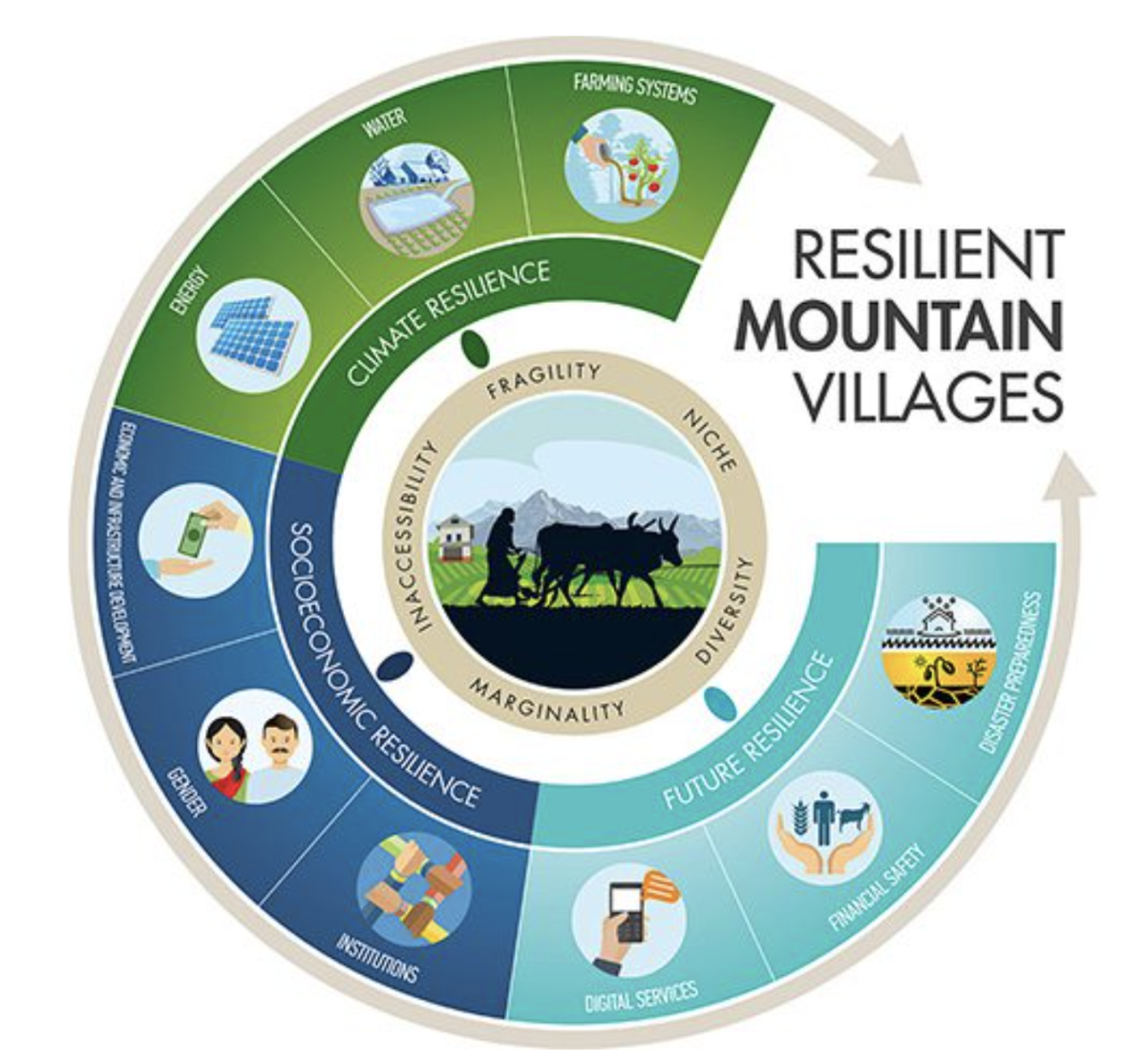Resilient women for resilient mountain villages: A holistic approach to climate change adaptation in Nepal

Summary
How can we enhance the existing adaptive capacities of women farmers to increase their resilience to climate change and potentially deteriorating socioeconomic conditions? The resilient mountain solution’sResilient Mountain Villages (RMV) is a holistic and integrated approach that offers simple, affordable, and replicable solutions for adaptation and resilience enhancement among vulnerable communities and ecosystems in mountain areas. This approach combines local knowledge and practices with scientific risk and vulnerability assessments, and is specifically targeted towards women and marginalized groups.
Over the past three decades, farming communities and ecosystems in the HKH region have been exposed to extreme climate vulnerabilities. Irregular rainfall patterns, sustained droughts, and higher incidences of insect and pest attacks have pushed farmers to rely on chemical pesticides to manage agricultural productivity. Climate change induced trends, like erratic rainfall and droughts, have also resulted in high male outmigration from villages. While the men go abroad to earn income for the family, women face increased socioeconomic pressures back home, in addition to the problems created by climate change. This has heavily impacted the adaptive practices and capacities of women farmers to maintain farms sustainably.
Overview
- Location:
- Implementation sites:
-
- Single country
- Multiple locations
- Mountain region:
-
Hindu Kush Himalaya
- Province:
-
- Kavre district
- Solution scale:
- Ecosystem type(s):
- Solution type(s):
- Sector(s):
- Climate impact(s) addressed:
- Other climate impact(s) addressed:
-
- Irregular rainfall
- Climate impact time-scale(s):
- Co-benefit(s) associated with the solution implementation:
- Implementation timeline:
-
- 2018 - 2022
- Sendai targets:
-
Solution details
Main beneficiaries & outcomes
Over 1,000 women farmers have learned about jholmal’s production and use, which has helped make farming systems more climate-resilient, whilst also increasing the income for local communities.
Planning and implementation
The pilot project is being implemented in eight villages of Kavre district in Nepal with support from ICIMOD. The pilot is working with 40 farmers’ groups, which include representatives from 1,089 households. Over 80% of these representatives are women and many are from marginalized communities. The Resilient Mountain Villages (RMV) project addresses:
- water scarcity
- soil nutrition
- crop productivity
- information gaps
- risk reduction
- institutional linkages
The RMV approach focuses specifically on women and marginalized groups to spearhead climate-smart practices by providing them with a wide range of information and resources relevant to climate change adaptation, training them to enhance their adaptive strategies and capacities, and linking them to a wider network of local institutions to facilitate collaborations and collective decision-making.
The approach was initially implemented on the basis of the “climate smart village” concept in collaboration with the Centre for Environmental and Agricultural Policy Research, Extension and Development (CEAPRED) in Kavrepalanchok. Kavrepalanchok is a hill district in Nepal with a varied climate ranging from subtropical to temperate. 70% of its population depend on agriculture for livelihood and income. Being relatively close to the Kathmandu Valley, and connected via two major highways, Kavre benefits from being linked to the capital’s largest agricultural market. However, increased use of chemical fertilisers and pesticides, has compromised the farmers’ capacity to sell their vegetables, as there is a negative perception about their produce in the market.

Example RMV interventions:
“Jholmal” is a biofertilizer and biopesticide that controls disease and pests in plants and improves plant health. It is produced using locally available resources such as cow dung, urine, and a combination of herbs. Initially, the women farmers in Kavre were hesitant about jholmal. It was difficult for them to imagine it as a viable alternative to chemical fertilizers. However, through the RMV project, more than 1,000 farmers have learned about its production and use, which has rejuvenated at-risk farming systems. Women’s groups like Shramjivi Women’s Farmers Group (SWFG) have been integral in realizing this climate-smart intervention.
This intervention is also linked to a series of other beneficial and affordable strategies that are directly connected to radically transforming agricultural practices and building resilience in communities. The project helped install an additional 24 biogas plants and revive existing defunct plants through regular maintenance. The project also emphasized strategies aimed at water conservation and increase in productivity, by introducing plastic-lined ponds to harvest rainwater and manage wastewater and provided training on making affordable drip and sprinkler irrigation systems.
Finance
N/A
Innovation
N/A
Capacities for design and implementation
Outlook & Scalability
Potential for upscaling and replication
Regular monitoring from high-level authorities, including Nepal’s National Planning Commission (NPC), has also aided upscaling efforts. The Government of Nepal has already adopted and included the RMV in its development plan and intends to pilot this approach in 14 districts.




Comments
There is no content